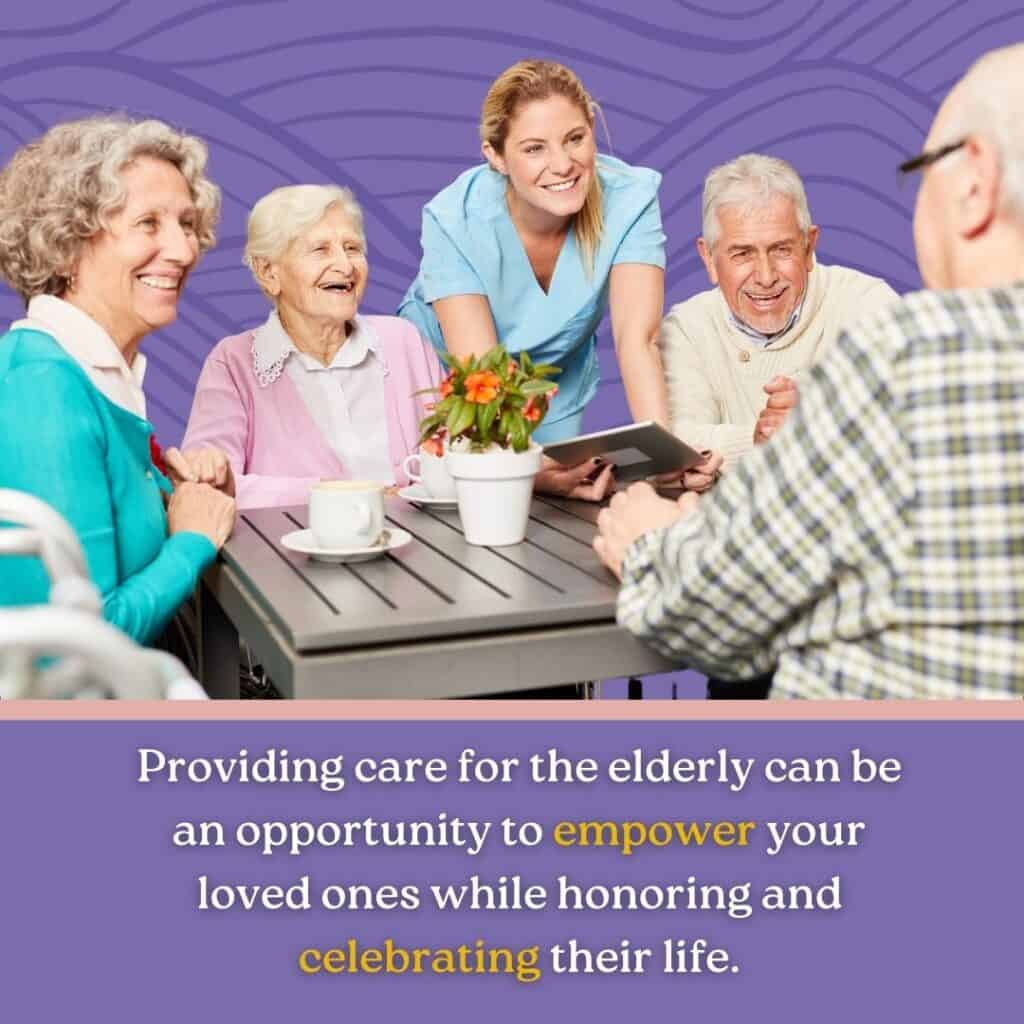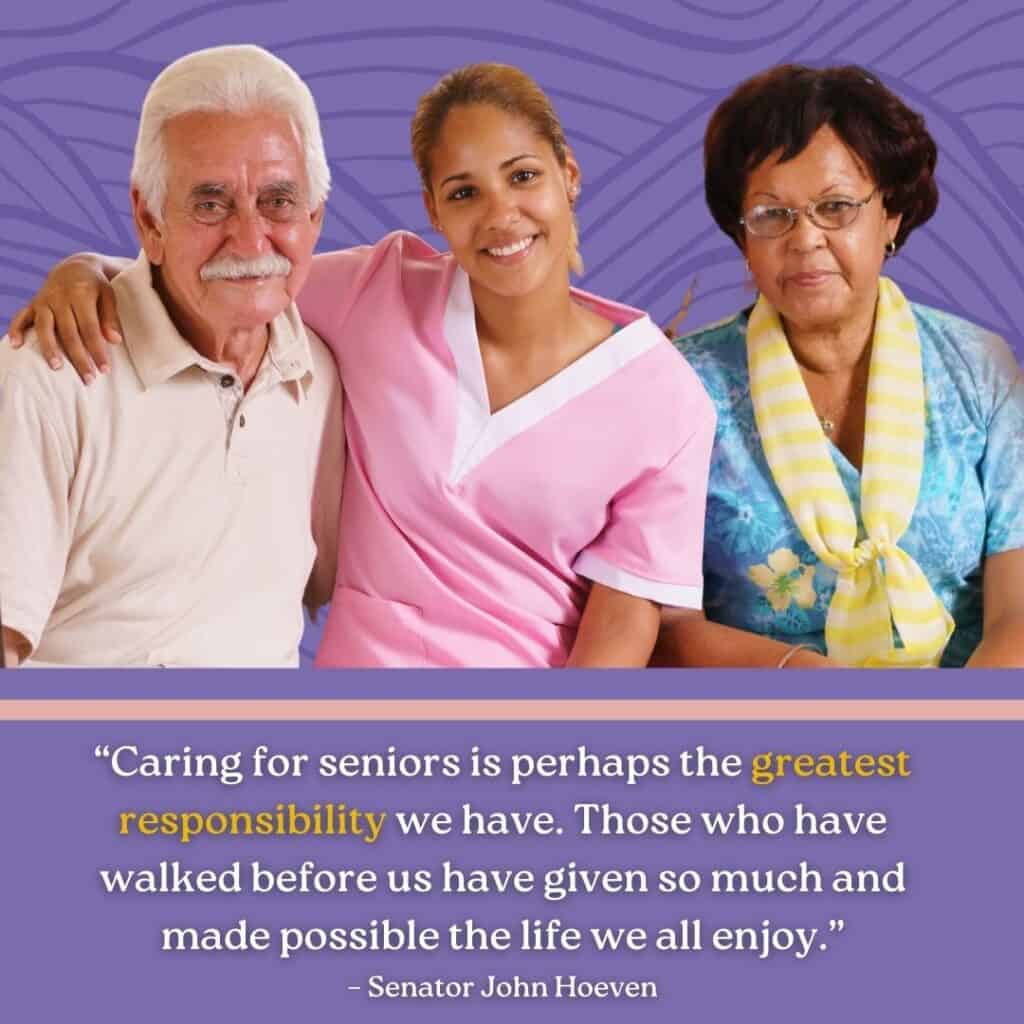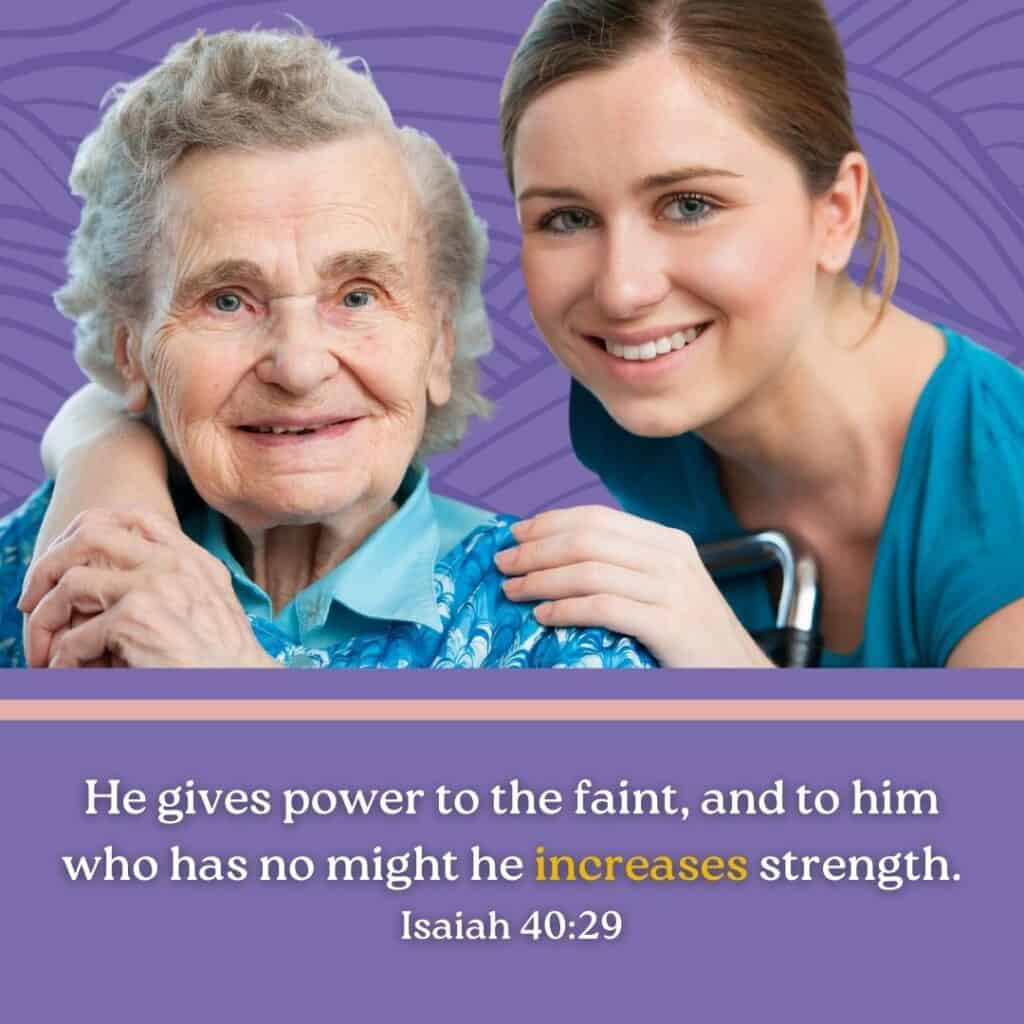Watching a loved one enter the final chapters of their life can be a heavy experience, but it doesn’t have to be. Providing care for the elderly can be an opportunity to empower your loved ones while honoring and celebrating their life.
Senator John Hoeven said, “Caring for seniors is perhaps the greatest responsibility we have. Those who have walked before us have given so much and made possible the life we all enjoy.” First, let’s clearly define what elder care is and what services it includes.

What is Eldercare?
Eldercare is an umbrella term for a service or group of services intended to help an elderly person live as comfortably and independently as possible. Types of care a person may require to increase their quality of life include, but are not limited to:
- In-Home Care
- Assisted Living
- Memory Care
- Nursing Homes
- Retirement Communities
- Geriatric Care Management
- Palliative Care
- Hospice
Let’s take a look at each of these types of care and how they serve those under the eldercare umbrella.
In-Home Care
In-home elderly care is also known as in-home care or home healthcare. This service provides assistance to those who wish to remain in the comfort of their homes as they age. General categories of in-home care include home healthcare, personal care assistance, companionship care, and respite care.
Assisted Living
Assisted living is a type of housing and care option for the elderly when they need some help with their daily activities. This option allows the person receiving care to maintain some independence while making day-to-day life a little easier. Someone providing care in the form of assisted living may prepare meals, perform housekeeping tasks, or help organize social activities.
Memory Care for the Elderly
Memory care is a long-term care option for individuals struggling with memory-related conditions. This includes dementia and Alzheimer’s. Memory care workers need special training to perform this type of care. A great memory care worker can provide both compassionate and respectful care to those struggling with brain-related illnesses. They’ll help with everything from daily activities to emotional support.
Nursing Homes
Nursing homes may also be referred to as Skilled Nursing Facilities (SNFs). These facilities differ from assisted living services because of the extent of care they provide. Nursing homes are typically for individuals who require a high level of medical and personal care. Residents of nursing facilities receive precise, supervised care, usually in the form of nutrition, medication management, social, safety, and rehabilitation services.
Retirement Communities
Retirement communities are an excellent option for those above the age of 55 who are looking to live among a community of like-minded people as they age. This type of care is usually geared towards retirees and empty-nesters. However, these communities may offer many assisted living services, like housekeeping, transportation, and planning social activities. Some communities may also offer memory care and safety services.
Geriatric Care Management
Navigating the complexities of aging can be challenging, and geriatric care management can help with this process. Geriatric care managers provide assistance and support in areas like care planning, crisis intervention, legal and financial advice, and more.
Palliative Care for the Elderly
Palliative care assists with managing the pain, stress, and symptoms associated with serious illness. This care is mainly for those facing life-limiting or terminal illness. Ideally, palliative care improves the quality of life for patients and their families by meeting their physical, emotional, social, and spiritual needs.
Hospice Care for the Elderly
Your loved one’s end-of-life experience is a precious chapter of their life, just as any chapter before. At-home hospice care provides services of comfort and quality of life for those who are terminally ill. Hospice care in the home is a great way to provide dignity-conserving care that puts both you and your loved one at ease while facing end-of-life issues. “This is one place where we get to be God with skin on for other people,” says Dr. Margaret Cottle.

How to Know if It’s Time for Eldercare
Are you wondering if it’s time for elder care? There are several signs that it may be time for a medical professional to assess the care of your elderly loved one. If your loved one exhibits any of the following signs, it’s wise to begin consulting with a healthcare provider on what type of eldercare services from which your loved one could benefit.
- Decline in Physical Health
- Recurring Loss of Memory
- Signs of Confusion
- Social Isolation
- Changes in Mobility
- Inability to Manage Finances
- Signs of Abuse or Neglect
- Severe Weight Loss or Signs of Malnutrition
Finding and Providing Care for the Elderly
Since eldercare services require a person to be closely involved with your loved one, it’s essential they provide quality and compatible care. The cost of at-home elderly care can vary widely depending on the level of care required, location, and other factors. Some seniors may have insurance coverage or government programs (like Medicaid) that can help offset costs. It is wise to continuously assess your elder’s living needs and to adjust their care plan accordingly when looking into eldercare services.
Self-Care & Care for the Elderly
One major element of providing care for the elderly that often goes overlooked is self-care for eldercare providers. Self-care is crucial for those who are providing care for the elderly.
As Christians, it is easy to neglect ourselves for the sake of others. We often excuse our neglect, thinking it’s a sacrifice we must make so that those we love can benefit. While there may be certain things in our lives we need to shift or re-evaluate in order to make time for caring for those we love, self-care should not be one of those things.
Scripture tells us that “He [God] gives power to the faint, and to him who has no might he increases strength” (Isaiah 40:29). We are not alone on the journey to provide care for the elderly; God is with us always.

Why is Self-Care Important?
Providing care for the elderly can be a physically, mentally, emotionally, and even spiritually taxing experience. It should go without saying that if your personal health declines, so will the quality of care your loved ones receive.
Self-care doesn’t mean you need to splurge on a big vacation, abandoning the ones you’re caring for altogether. Sometimes, self-care is as simple as getting enough sleep or making time to interact with people outside of your day-to-day routines.
For reference, here are a few ideas of how you can practice self-care in your day-to-day life.
5 Simple Self-care Ideas to Consider
- Respite Care. Consider looking into respite care services. Respite care services provide temporary relief for caregivers.
- Stay Socially Connected. Remember to invest time into your own social life. If things seem overwhelming, having a date night with your spouse or a lunch date with a friend can help put life back into perspective.
- Seek Professional Help. Sometimes, providing care for the elderly can be a traumatic experience for caregivers. There’s no shame in seeking help from a licensed professional to discuss issues that might arise during your time as a caregiver.
- Delegate. Remember, you don’t have to do everything yourself. You’d be surprised at how helpful friends, family members, and neighbors will be if they know you need help.
- Celebrate Small Wins. Celebrating small wins can have a drastic impact on your mental and emotional health. Remember that eldercare is a journey, and each triumph is worth celebrating, no matter how small.
Where to Begin
If someone you know is in need of eldercare services, the best place to start is by reaching out to their doctor. Express your concerns and the struggles you or your loved one is facing. Ask for advice on how to move forward. Seeking out care can be the beginning of a new chapter, one in which you and those you love are empowered to live healthier, happier lives.
















